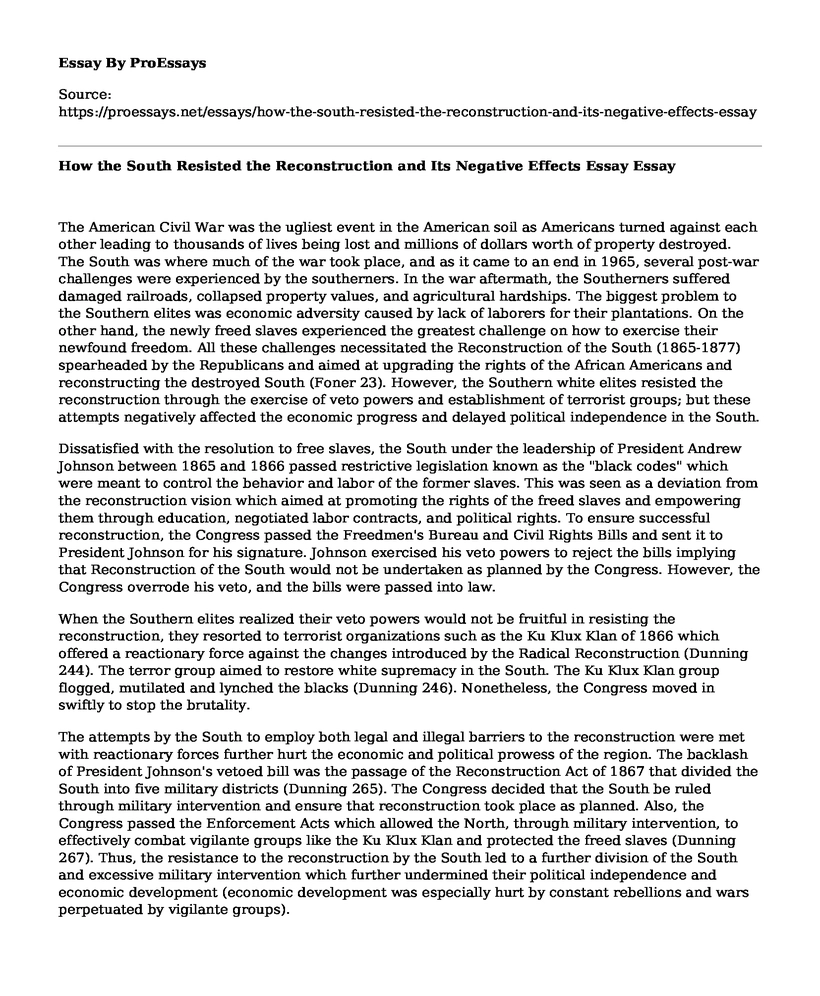The American Civil War was the ugliest event in the American soil as Americans turned against each other leading to thousands of lives being lost and millions of dollars worth of property destroyed. The South was where much of the war took place, and as it came to an end in 1965, several post-war challenges were experienced by the southerners. In the war aftermath, the Southerners suffered damaged railroads, collapsed property values, and agricultural hardships. The biggest problem to the Southern elites was economic adversity caused by lack of laborers for their plantations. On the other hand, the newly freed slaves experienced the greatest challenge on how to exercise their newfound freedom. All these challenges necessitated the Reconstruction of the South (1865-1877) spearheaded by the Republicans and aimed at upgrading the rights of the African Americans and reconstructing the destroyed South (Foner 23). However, the Southern white elites resisted the reconstruction through the exercise of veto powers and establishment of terrorist groups; but these attempts negatively affected the economic progress and delayed political independence in the South.
Dissatisfied with the resolution to free slaves, the South under the leadership of President Andrew Johnson between 1865 and 1866 passed restrictive legislation known as the "black codes" which were meant to control the behavior and labor of the former slaves. This was seen as a deviation from the reconstruction vision which aimed at promoting the rights of the freed slaves and empowering them through education, negotiated labor contracts, and political rights. To ensure successful reconstruction, the Congress passed the Freedmen's Bureau and Civil Rights Bills and sent it to President Johnson for his signature. Johnson exercised his veto powers to reject the bills implying that Reconstruction of the South would not be undertaken as planned by the Congress. However, the Congress overrode his veto, and the bills were passed into law.
When the Southern elites realized their veto powers would not be fruitful in resisting the reconstruction, they resorted to terrorist organizations such as the Ku Klux Klan of 1866 which offered a reactionary force against the changes introduced by the Radical Reconstruction (Dunning 244). The terror group aimed to restore white supremacy in the South. The Ku Klux Klan group flogged, mutilated and lynched the blacks (Dunning 246). Nonetheless, the Congress moved in swiftly to stop the brutality.
The attempts by the South to employ both legal and illegal barriers to the reconstruction were met with reactionary forces further hurt the economic and political prowess of the region. The backlash of President Johnson's vetoed bill was the passage of the Reconstruction Act of 1867 that divided the South into five military districts (Dunning 265). The Congress decided that the South be ruled through military intervention and ensure that reconstruction took place as planned. Also, the Congress passed the Enforcement Acts which allowed the North, through military intervention, to effectively combat vigilante groups like the Ku Klux Klan and protected the freed slaves (Dunning 267). Thus, the resistance to the reconstruction by the South led to a further division of the South and excessive military intervention which further undermined their political independence and economic development (economic development was especially hurt by constant rebellions and wars perpetuated by vigilante groups).
Conclusion
Therefore, the legal and illegal means employed by the South to resist the Reconstruction attracted reactionary measures from the United States government which resulted in excessive control over the South and eventually undermined its economic development and political independence.
Works cited
Dunning, William Archibald. Reconstruction, Political and Economic, 1865-1877. Vol. 22. Harper & brothers, 1877.
Foner, Eric. A short history of reconstruction. Harper Collins, 2015.
Cite this page
How the South Resisted the Reconstruction and Its Negative Effects Essay. (2022, Jul 28). Retrieved from https://proessays.net/essays/how-the-south-resisted-the-reconstruction-and-its-negative-effects-essay
If you are the original author of this essay and no longer wish to have it published on the ProEssays website, please click below to request its removal:
- Mahatma Gandhi: An Indian Model of Servant Leadership
- US Classism Essay Example
- Essay Example on Headstrong Historian: Nigeria's Journey From Colonialism to Freedom
- The Peloponnesian and Delian Leagues: Ancient Greece's Unifying Alliances - Essay Sample
- Essay Example on Combating HPV in African American Women: Exploring a Program to Reduce Infection
- Paper Example on Gig Economy: Impact of Short-Term Contracts on Organizational Culture
- Essay Sample on British Colonization of the Americas: Challenges and Success







